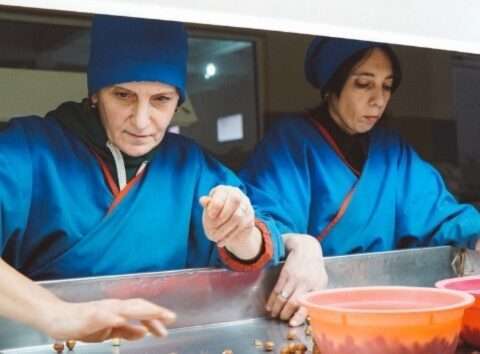Customers in the Osh and Batken regions of the Kyrgyz Republic will now benefit from better access to medicines at an affordable price ‒ something that is particularly important for hygiene and health reasons during the Covid-19 pandemic.
The modern and energy efficient pharmacy warehouse was unveiled today in the city of Osh, in a ceremony attended by representatives of the Osh city Mayor’s Office, DemirBank, the EBRD and other officials.
The 1,600 square metre facility, built to the highest international standards, will help Darmek Pharm reduce its operating costs and increase medicine turnover, also through direct partnerships with international suppliers. The warehouse is equipped with modern and efficient thermal insulation, a water supply and the lighting, heating and ventilation systems necessary to preserve the shelf life of the drugs supplied.
Darmek Pharm built the storage facility with the help of a US$ 350,000 loan from DemirBank under the Kyrgyz Sustainable Energy Financing Facility (KyrSEFF+), with the EBRD taking on part of the risk under a risk-sharing facility with DemirBank. The EU provided a US$ 45,000 grant towards the construction costs.
Darmek Pharm has received technical and financial assistance, which allowed it to unlock access to finance, facilitated its expansion and helped the retailer in business planning. The support was provided through EBRD’s Advice for Small Businesses, the Bank’s Small Business Impact Fund, supported by Switzerland and the European Union.
KyrSEFF+, a joint programme by the EBRD and the EU, finances and provides grants for owners of commercial and residential buildings to invest in measures that save energy, water and other resources. Since 2013, the programme has financed more than 3,000 energy-efficiency projects to the tune of over US$ 50 million. It has also provided US$ 6.3 million in EU grants to 1,930 projects. In total, each year, these successful projects save 177 million kilowatt-hours of electricity, conserve 111,000 cubic meters of water and reduce CO2 emissions by more than 61,000 tonnes.
These investments are particularly important for the Kyrgyz Republic’s energy-intensive economy, which is seeing annual growth in power usage and recurring periods of low water supply amid outdated energy and heating infrastructure.






